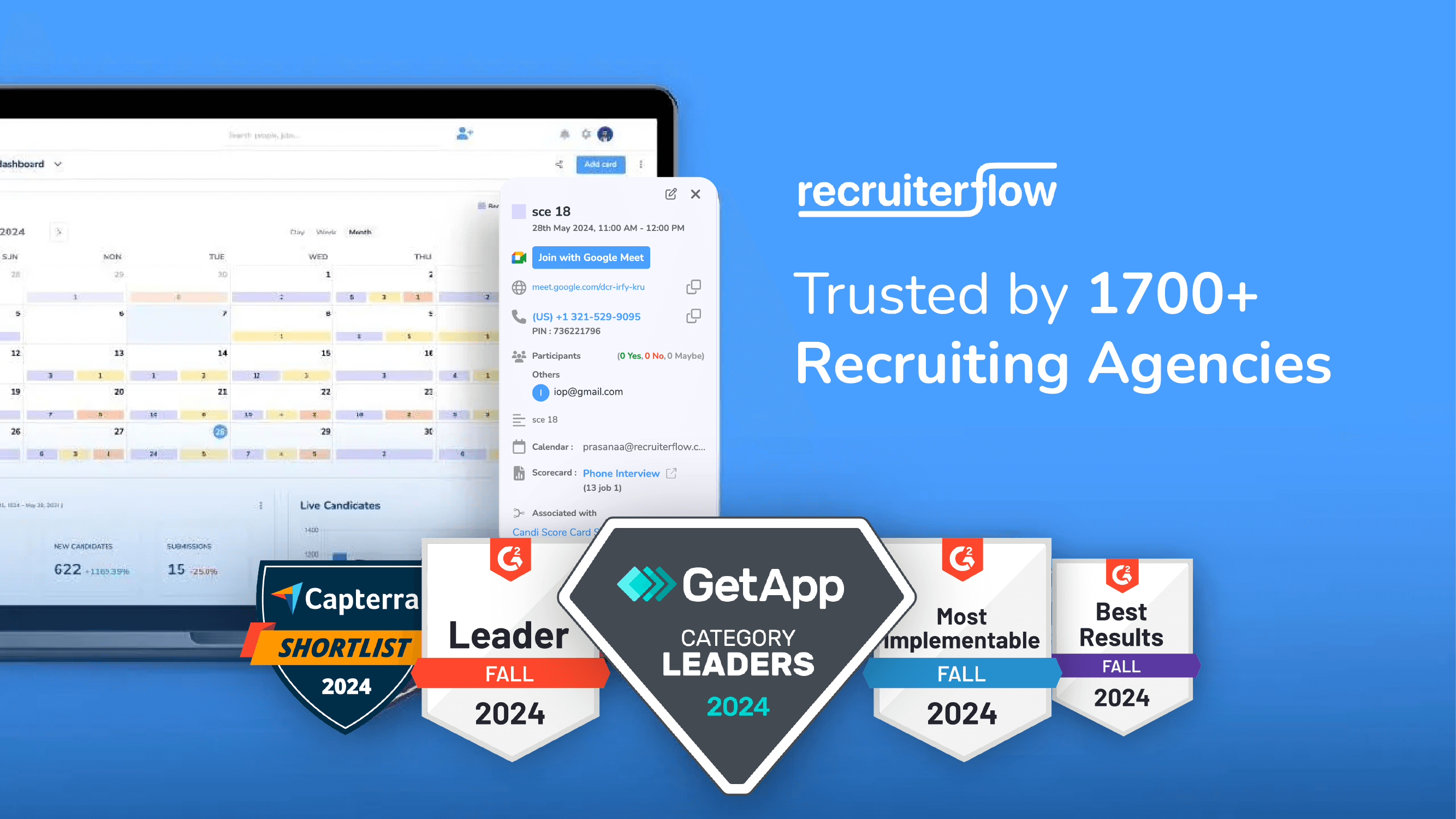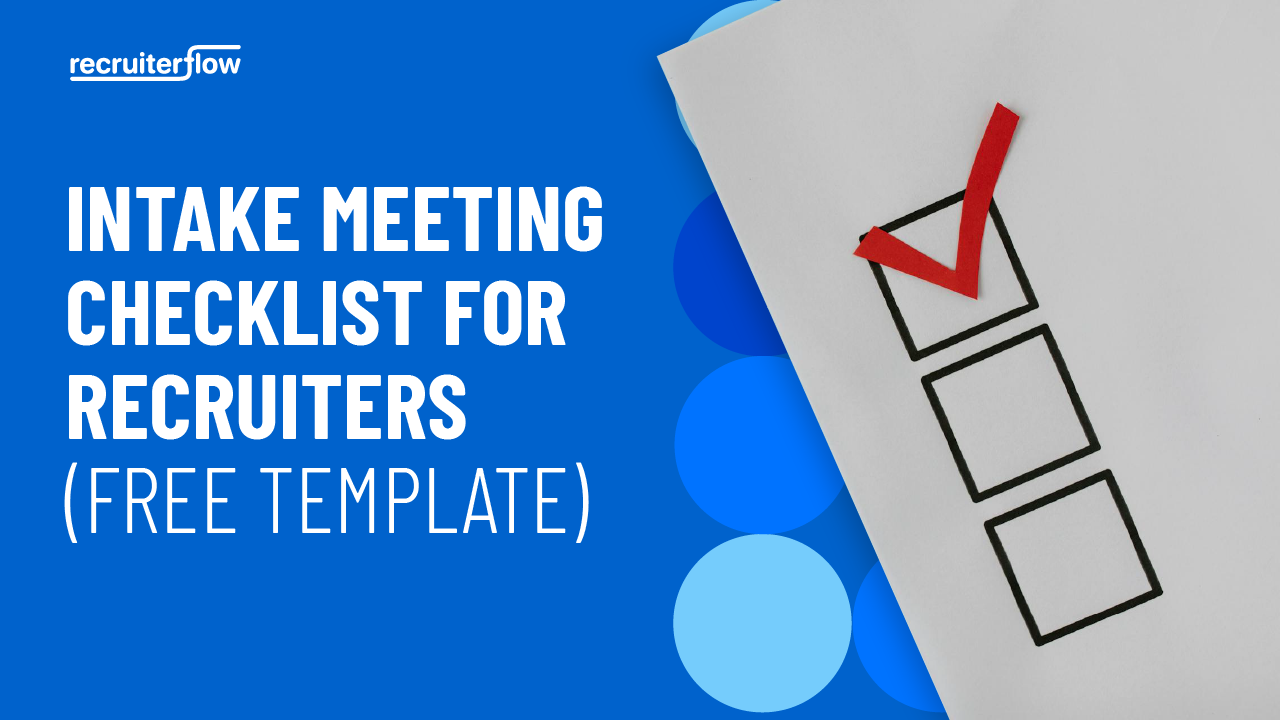
Recruiter Training: The Ultimate Guide to Developing Top Performers in 2025

Recruitment agencies function as powerful engines that bring talent into organizations and help shape both company futures and career paths. The true magic of recruitment unfolds behind the scenes as recruiters balance client and candidate needs, navigate volatile job markets and make essential placements. This is where recruiter training becomes paramount.
Identifying what sets apart a top performer from a good recruiter reveals the essential role of deliberate and continuous training tailored to agency-specific challenges.
Effective recruiter training demands a structured and continuous approach that addresses the distinct challenges faced by agency professionals.
Agency leaders and team leads, alongside ambitious recruiters who wish to establish a culture of excellence, should consult this ultimate guide.
In this guide, we’ll break down:
- What is recruiter training & why is it important?
- How to design an effective recruiter training program?
- Defining KPIs and outcomes of a recruiter training program.
- Resources & tools to design a recruiter training program.
What is Recruiter Training & Why is it Important?
Recruiter training encompasses organized learning approaches that equip recruiters with the necessary expertise to perform optimally in their positions.
Agency recruiters must master both the creative and analytical skills involved in talent acquisition beyond simply posting job listings and reviewing resumes to succeed in today’s competitive environment.
Why is recruiter training so crucial?
Market Complexity
The recruitment field undergoes quick changes, which include new sourcing channels and shifting candidate expectations along with emerging industries. Training ensures recruiters stay ahead.
Quality of Hires
Recruiters who undergo thorough training show superior abilities in selecting top-tier talent. Recruiters who receive proper training develop enhanced skills to understand client requirements and deliver lasting job placements.
Client Satisfaction
Agencies live and die by client relationships. Training helps recruiters provide consultative value-based interactions that cultivate repeat client business.
Candidate Experience
Each interaction from initial contact through onboarding is significant. Training enables recruiters to create candidate journeys that run smoothly while respecting and engaging candidates.
Productivity and Efficiency
Effective training optimizes recruitment operations by minimizing mistakes and helping recruiters complete placements more quickly, which is essential when businesses require both rapid results and high-quality outcomes.
Retention and Morale
Ongoing development leads recruiters to feel appreciated in their roles and helps reduce their burnout risk and the chance of moving to a competitor.
Promotes diversity and inclusion
Through DEI training, recruiters learn how to identify bias and take steps to eliminate it. This leads to more equitable hiring processes.
Also read: 10 Soft Skills Successful Recruiters have in Common
Designing Effective Recruiter Training Programs for Agencies
An ideal training program remains purposeful and flexible while being customized to fulfill your agency’s specific requirements.
The training program must combine essential knowledge foundations with practical skills and support continuous professional growth.
Key Components of an Effective Training Program:
1. Structured Onboarding
Company Culture & Values
You should introduce new employees to your agency’s mission, vision, and values immediately from their first day.
Process Training
Guide your new recruits through every stage of your recruitment process, beginning with job intake until aftercare placement.
Technology Training
Practical exercises with your ATS platform and CRM systems and your sourcing and communication tools.
Compliance & Ethics
The training program should include legal requirements such as EEO and GDPR, with anti-discrimination laws as well as data security protocols and ethical guidelines.
Here are the steps you can take:
- Develop an onboarding plan that covers the first 30-60-90 days with specific milestones and checklists.
- Provide every new recruiter with a dedicated mentor or “buddy” who will offer continuous support.
- Implement blended learning by integrating e-learning modules with live workshops and shadowing sessions.
2. Core Skills Development
Sourcing Mastery
Instruct recruiters in advanced Boolean search methods and introduce X-ray techniques and the use of LinkedIn Recruiter and niche job boards.
Screening & Interviewing
Develop recruiters’ interviewing skills through structured competency-based methods and implement assessment tools.
Client Management
Enhance consultative selling abilities along with mastering client briefing methods and managing expectations.
Negotiation & Closing
Focus on mastering offer management practices; learn to handle counteroffers and implement closing strategies effectively.
Here are the steps you can take:
- Hold weekly skill clinics to allow your recruiters to practice sourcing alongside interviewing and negotiation within real-world situations.
- Build confidence for high-stakes conversations with role-play and simulation exercises.
- Capture your actual client and candidate calls for coaching purposes and feedback after getting permission.
3. Business Development & Sales
Lead Generation
Train every recruiter to recognize potential leads and develop sales pipelines while utilizing referral networks for growth.
Pitching & Presenting
Learn to create effective proposals response to RFP for your clients and deliver powerful pitches.
Account Management
Develop skills in upselling and cross-selling and learn to deepen relationships with your clients.
Here are the steps you can take:
- Establish a “sales academy” that runs frequent workshops about prospecting techniques alongside objection handling and closing sales.
- Recruiters should establish personal business development objectives and monitor their advancement.
- Use team meetings to celebrate wins by presenting success stories and best practices.
4. Continuous Learning & Specialization
Market Intelligence
Regularly deliver updates on industry trends alongside salary benchmarks and competitor activities.
Diversity, Equity & Inclusion
Provide continuous DEI training to minimize discrimination and broaden recruitment prospects.
Specialist Tracks
Your recruiters should receive specific training to specialize in different industry verticals such as technology, healthcare, and finance.
Here are the steps you can take:
- Organize monthly lunch events that feature guest speakers representing various industry sectors.
- Establish a resource library featuring articles alongside webinars and research reports.
- Motivate recruiters to obtain external certifications and offer incentives for their completion.
Best Practices for Ongoing Recruiter Training and Coaching
Training is not a one-off event. Top agencies develop a work environment that prioritizes ongoing enhancement through constant feedback and shared learning experiences.
Establish continuous development as an integral part of your agency’s operations.
1. Regular Coaching and Feedback
One-on-Ones
Set up weekly or bi-weekly meetings dedicated to discussing performance outcomes and addressing development challenges.
Real-Time Feedback
Real-time feedback emerges through call recording assessments, along with email reviews and active live shadowing practices.
360-Degree Feedback
Collect performance feedback from colleagues, clients, as well as job candidates to obtain a complete assessment of work performance.
Steps to take:
- Educate team leads and managers about coaching skills by highlighting strengths and asking open-ended questions while establishing clear SMART goals.
- Employ feedback tools such as survey platforms and Slack channels to consistently gather and distribute insights.
2. Peer Learning and Knowledge Sharing
Team Huddles
Begin every week with a brief team gathering to discuss successes alongside current difficulties and helpful suggestions.
Best Practice Sharing
Use reliable intranet software or shared document repository to store scripts along with email templates and sourcing tips.
Mentorship Programs
Create mentorship connections between new recruiters and seasoned professionals to ensure continuous support.
Steps to take:
- Switch responsibility for leading team huddles among team members to foster broader participation.
- Provide recognition and rewards to recruiters who share valuable resources or insights.
3. Role-Playing and Simulation
Scenario Practice
Frequently practice challenging client conversations along with candidate negotiation techniques and objection resolution methods.
Mock Interviews
Take turns conducting mock interviews with one another while exploring various professional positions and industry-specific contexts.
Steps to take:
- Designate monthly days specifically for recruiters to practice real-world scenarios through role-playing exercises.
- At the session’s conclusion, hold a debrief to evaluate successful elements and identify areas needing improvement.
4. External Training and Certifications
Industry Conferences
Promote participation in recruiting events as well as webinars and workshops.
Certifications
Support the team of recruiters in obtaining industry-recognized qualifications, which will be detailed in the subsequent section.
Steps to take:
- Establish a professional development budget for every recruiter in your company.
- Devise yearly training objectives for recruiters and evaluate their development during performance reviews.
KPIs and Outcomes for Recruiter Training
Monitoring appropriate KPIs confirms that your training program delivers substantial business benefits.
Essential KPIs for Agency Recruiters:
| KPI | What It Measures | Why It Matters |
| Time-to-Fill | Days from job opening to placement | Speed and efficiency |
| Quality of Hire | Client/candidate satisfaction, retention | Long-term success of placements |
| Submission-to-Interview | % of submitted candidates interviewed | Sourcing and screening effectiveness |
| Interview-to-Offer | % of interviews resulting in offers | Candidate quality and client alignment |
| Offer Acceptance Rate | % of offers accepted by candidates | Candidate engagement and negotiation skills |
| Client Satisfaction | NPS, repeat business, referrals | Service quality and loyalty |
| Candidate Experience | Survey scores, testimonials | Brand reputation and candidate pipeline |
| Revenue per Recruiter | Total fees generated per recruiter | Individual and team productivity |
Here’s how to measure training effectiveness:
Pre and Post-Training Assessments
Evaluate candidate knowledge and abilities both before they start the training modules and after they complete them.
KPI Trends
Monitor essential metrics over time to identify positive changes that result from training programs.
Qualitative Feedback
Collect feedback from recruiters, clients and candidates about perceived training improvements.
Training ROI
Evaluate training expenditure by analyzing its impact on revenue growth and betterment in placement rates and retention figures.
Steps to take:
- Develop specific and quantifiable goals for each training program (e.g., “Decrease time-to-fill by 20% within six months”).
- During monthly or quarterly business reviews, measure KPIs to recognize achievements and determine which areas require additional development.
- Data analysis should drive personalized coaching approaches by concentrating on distinct strengths and areas needing growth.
Recommended Resources and Tools
Appropriate tools and technological solutions have the potential to greatly enhance recruiter training programs, which leads to maintaining your team’s edge.
The following resources represent the best options for agency recruiters:
Recommended Blog & Webinar
Learn how to train and develop new recruiters into top performers with our webinar, ‘How to Hire and Train New Recruiters into Top Performers!’ In this session, Brianna Rooney, CEO of TheMillionaireRecruiter, shares her expert insights on building a powerhouse recruiting team that drives long-term success.
Also, this dedicated blog about recruiting certifications should be your top read. This resource discusses the top certifications available for recruiters at every level to help you determine the best development path for your team.
Industry Certifications
Potential credentials can be acquired from professional organizations such as ATAP (Association of Talent Acquisition Professionals), LinkedIn, SHRM and AIRS. Certifications validate expertise and boost credibility.
Online Learning Platforms
You can find sourcing and interviewing courses on Coursera, Udemy, and LinkedIn Learning, along with training in sales and negotiation skills.
Books
The books “Who: The A Method for Hiring” by Geoff Smart and “Recruit Rockstars” by Jeff Hyman, with “Hiring for Attitude” by Mark Murphy, offer outstanding insights.
Podcasts
“Grow With The Flow”, “Recruiting Brainfood,” “The Recruiting Future Podcast,” and “The Talent Cast” deliver continuous insight and motivation.
Communities
Enhance your recruiting expertise by participating in LinkedIn and Facebook recruiter groups as well as Slack communities to exchange information and keep updated with current trends.
The necessary tools required to train your recruiting team include several vital resources:
Learning Management System (LMS)
The platforms Lessonly, TalentLMS, and Trainual and other Highspot alternatives are designed to facilitate training module delivery and tracking.
Applicant Tracking System (ATS)
Today’s Applicant Tracking Systems, such as Recruiterflow, Bullhorn and Greenhouse, help optimize recruitment processes and generate useful coaching data.
Call Recording and Analysis
The software tools Gong and Chorus facilitate feedback through call review.
Assessment Platforms
Recruiter evaluation and candidate ability measurement are supported by assessment platforms such as Codility for tech positions, alongside Criteria Corp and Vervoe.
Survey Tools
Gather feedback from clients, candidates and team members through SurveyMonkey and Google Forms tools.
Steps to take:
- Conduct a thorough examination of your current technology stack to discover gaps and potential improvements for optimizing training and performance management processes.
- Develop a central resource hub using Google Drive, Notion or your LMS to store all necessary training materials together with guides and best practices.
- Hold quarterly “tech refresh” sessions to reveal new tools alongside helpful tips.
Conclusion
The key advantage of high-performing agencies lies in their recruiter training.
Training helps you go beyond just basic job posting and call training to develop a pro team that provides significant benefits to both clients & candidates.
Structured onboarding programs combined with continuous coaching and proper resources help recruiters succeed in super competitive markets.
Measure key performance benchmarks and promote ongoing education to make sure your training programs continuously adapt to new challenges.
And the result? Your agency flourishes through a team of top performers who deliver excellent hires and satisfied clients on a consistent basis.
Launch your training program immediately to see your agency’s reputation and results achieve new heights.
Learn How Our AI-Powered Recruitment Platform Can Help Your Agency

Recruiterflow is an all-in-one AI recruitment software that serves as a command center for all your agency’s recruitment operations:
- AI-first screening and sourcing tools
- AI recruiting assistant
- Unified ATS & CRM
- Centralized candidate database
- Automated, multi-channel outreach (Email, SMS, Call & Socials)
- No-code recruiting automation
- Data enrichment capabilities
- Advanced reporting and analytics
- Open APIs and a host of integrations
Hudson B., CEO & Founder, reviewed us on G2Crowd:
“We’ve been using RecruiterFlow for the past two years and it has streamlined our recruiting process. The platform has a user-friendly interface and automation tools that help us efficiently manage candidate pipelines, reduce manual tasks, and communicate with clients. It serves as the command center for our recruiting operation, allowing us to focus on building relationships. They have exceptional customer success, are quick to assist, eager to hear feedback, and committed to product development. I recommend it to any agencies looking to optimize their workflows.”
See it in action now: Book a free demo
Recruitment





Pragadeesh Natarajan